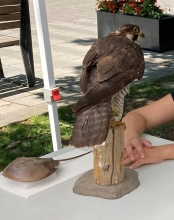Image Caption: The Mackenzie River Delta on the Beaufort Sea, a low-lying region in the Canadian Arctic that is vulnerable to rising seas in a warming climate. CREDIT: Nadia and Harold Gomez


Spinal cerebellar ataxia 6 (SCA6) is an inherited neurological condition which has a debilitating impact on motor coordination. Affecting around 1 in 100,000 people, the rarity of SCA6 has seen it attract only limited attention from medical researchers. To date, there is no known cure and only limited treatment options exist.
Now, a team of McGill University researchers specializing in SCA6 and other forms of ataxia, have published findings that not only offer hope for SCA6 sufferers but may also open the way to developing treatments for other movement disorders.

On August 10, thirty or so undergraduate students gathered in Leacock 232 to share their experiences as researchers in the Faculty of Science over the summer.

Ten students have been named McGill University’s recipients of the prestigious Schulich Leader Scholarships, Canada’s premier Science, Technology, Engineering and Math (STEM) scholarships.
Created by McGill alumnus Seymour Schulich, BSc’61, MBA’65, DLitt’04, the Schulich Leader Scholarships are awarded to entrepreneurial-minded students who’ve demonstrated academic excellence and display leadership, charisma and creativity.

If you’ve ever seen a starling peck open a garbage bag or a grackle steal your dog pellets, you get a sense that some birds have learned to take advantage of new feeding opportunities – a clear sign of their intelligence. Scientists have long wondered why certain species of birds are more innovative than others, and whether these capacities stem from larger brains (which intuitively seems likely) or from a greater number of neurons in specific areas of the brain.

For the generations who grew up watching Finding Nemo, it might not come as a surprise that the North American West Coast has its own version of the underwater ocean highway – the California Current marine ecosystem (CCME). The CCME extends from the southernmost tip of California up through Washington. Seasonal upward currents of cold, nutrient-rich water are the backbone to a larger food web of krill, squid, fish, seabirds and marine mammals. However, climate change and subsequent changes in ocean pH, temperature and oxygen levels are altering the CCME — and not in a good way.

Many mammal species living in cold climates tend to have large bodies and short limbs to reduce heat loss – a general pattern known as Bergmann’s rule. However, bats are the exception to the rule, displaying small body sizes in both hot and cold regions. A McGill-led team of researchers is shedding light on this long-standing debate over bats’ body sizes and focus on why bats are seemingly non-conforming to ecogeographical patterns found in other mammals. Their findings offer a new method for investigating complex macroecology across bat species.

Imagine having to choose over and over between what you enjoy doing and the pain that it might cause you, whether physical or emotional. If you live with conditions such as depression, anxiety, or chronic pain, you are probably familiar with making these difficult choices on a daily or weekly basis. But surprisingly little is known about which areas of the brain are involved in decisions of this kind.
Sustainable agricultural practices require considerable investments, and smallholder famers may not realize gains for years. Without secure land tenure, they lack incentive to invest in long-term benefits. Instead, many opt to use the land as intensively as possible each year since they have no guarantee for the future. This is just one example of how land tenure security intersects with sustainable development, a relationship explored in-depth in a recent book co-edited by Brian Robinson, an associate professor in the Department of Geography at McGill University.

McGill undergraduates have a unique opportunity to expand their climate science literacy and acquire tools for taking action to reduce the impacts of the unfolding climate crisis.
Registration is now open to students in every program for FSCI 198: Climate Crisis and Climate Actions, a new undergraduate course featuring a team of multi-disciplinary instructors who will present diverse perspectives on the scientific and social dimensions of climate change.
- Faculty of Agricultural and Environmental Sciences
- Faculty of Arts
- Dept. of Atmospheric and Oceanic Sciences
- Dept. of Biology
- Dept. of Chemistry
- School of Computer Science
- Faculty of Engineering
- Faculty of Education
- Dept. of Earth and Planetary Sciences (EPS)
- Dept. of Geography
- Faculty of Law
- Dept. of Mathematics and Statistics
- Environment
- Desautels Faculty of Management
- Dept. of Physics
- Dept. of Psychology
- Redpath Museum
- Schulich School of Music
- Faculty of Science

Enjoy the beautiful summer weather and join the Redpath Museum outdoors to see and touch specimens from their natural history and world cultures collections. Fossils, skulls, minerals, ancient pottery... you never know what you'll find!
Every Wednesday and Thursday through August 18th: 10:00 am - 2:00 pm. Different themes each day. Cancelled if it rains.
Sherbrooke St. West and McGill College, east side, inside the Roddick Gates. Look for the white pop-up awning.

Astronomers at McGill University, MIT and elsewhere have detected a strange and persistent radio signal from a far-off galaxy, that appears to be flashing with surprising regularity. Classified as a fast radio burst, or FRB, this new signal persists for up to three seconds, about 1,000 times longer than the average FRB. Within this window, the team detected bursts of radio waves that repeat every 0.2 seconds in a clear periodic pattern.
Tackling climate change and preserving biodiversity a key priority for McGill and Quebec
The Fonds de recherche du Québec announced its latest rounds of funding earlier this month in support of research, training, and initiatives to tackle major societal challenges—including climate change and biodiversity loss.

Each mistletoe berry can produce up to two metres of a gluey thread called viscin. It allows the seeds of this parasitic plant to stick to and infect host plants. Since ancient times, mistletoe berries have been explored as treatments for everything from infertility and epilepsy to cancer. But, until now, no one has fully investigated the potential medical or technical uses of the glue itself.

Fever, cough, sore throat – symptoms in the spotlight in the era of COVID-19 – are just some of the tell-tale signs of our body’s immune system kicking into action against an unwanted intruder. Whether triggered by an infection, an allergen, or a vaccine, immune responses are driven by a complex array of cellular processes that can play out over several days or even weeks.
